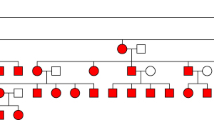Abstract
A recent literature review of commentaries and ‘state of the art’ articles from researchers in psychiatric genetics (PMG) offers a consensus about progress in the science of genetics, disappointments in the discovery of new and effective treatments, and a general optimism about the future of the field. I argue that optimism for the field of psychiatric molecular genetics (PMG) is overwrought, and consider progress in the field in reference to a sample estimate of US National Institute of Mental Health funding for this paradigm for the years 2008 and 2009. I conclude that the amounts of financial investment in PMG is questionable from an ethical perspective, given other research and clinical needs in the USA.
Similar content being viewed by others
References
Abbott, A. 2008. Psychiatric genetics: The brains of the family. Nature 454(7201): 154–157.
Akil, H., et al. 2010. The future of psychiatric research: Genomes and neural circuits. Science 327: 1580–1581.
Arguello, P.A., and J.A. Gogos. 2006. Modeling madness in mice: one piece at a time. Neuron 52(1): 179–196.
Ayhan, Y., A. Sawa, et al. 2009. Animal models of gene-environment interactions in schizophrenia. Behavioural Brain Research 204(2): 274–281.
Burmeister, M., M.G. McInnis, et al. 2008. Psychiatric genetics: progress amid controversy. Nature Reviews. Genetics 9(7): 527–540.
Cohen-Woods, S., A. Schosser, et al. 2009. From age correction to genome-wide association. Acta Psychiatrica Scandinavica 120(5): 355–362.
Collins, F. 2010. Has the revolution arrived? Nature 464: 674–675.
DeLisi, L.E., and S.V. Faraone. 2006. When is a “positive” association truly a “positive” in psychiatric genetics? A commentary based on issues debated at the World Congress of Psychiatric Genetics, Boston, October 12–18, 2005. American Journal of Medical Genetics. Part B: Neuropsychiatric Genetics 141B(4): 319–322.
Grob, G.N., and H.H. Goldman. 2006. The dilemma of federal mental health policy: Radical reform or incremental change? New Brunswick: Rutgers University Press.
Hallmayer, J.F. 2004. Psychiatric genetics: what to expect. Current Psychiatry Reports 6(3): 149–150.
Healy, D. 1997. The antidepressant era. Cambridge: Harvard University Press.
Healy, D. 2002. The creation of psychopharmacology. Cambridge: Harvard University Press.
Holden, C. 2009. Depression gene. Back to the drawing board for psychiatric genetics. Science 324(5935): 1628.
Hough, C.J., and R.J. Ursano. 2006. A guide to the genetics of psychiatric disease. Psychiatry 69(1): 1–20.
Insel, T.R. 2009. Disruptive insights in psychiatry: transforming a clinical discipline. The Journal of Clinical Investigation 119(4): 700–705.
Insel, T.R., and T. Lehner. 2007. A new era in psychiatric genetics? Biological Psychiatry 61(9): 1017–1018.
Insel, T.R., and P.S. Wang. 2010. Rethinking mental illness. JAMA 303(19): 1970–1971.
Keller, M.C., and G. Miller. 2006. Resolving the paradox of common, harmful, heritable mental disorders: which evolutionary genetic models work best? The Behavioral and Brain Sciences 29(4): 385–404.
Kendler, K.S. 2005a. Psychiatric genetics: a methodologic critique. The American Journal of Psychiatry 162(1): 3–11.
Kendler, K.S. 2005b. “A gene for...”: the nature of gene action in psychiatric disorders. The American Journal of Psychiatry 162(7): 1243–1252.
Kendler, K.S., and R.J. Greenspan. 2006. The nature of genetic influences on behavior: lessons from “simpler” organisms. The American Journal of Psychiatry 163(10): 1683–1694.
Khoury, M.J., J. Evans, and W. Burk. 2010. A reality check for personalized medicine. Nature 464: 680.
Laporte, J.L., R.F. Ren-Patterson, et al. 2008. Refining psychiatric genetics: From ‘mouse psychiatry’ to understanding complex human disorders. Behavioural Pharmacology 19(5–6): 377–384.
Levinson, D.F. 2005. Meta-analysis in psychiatric genetics. Current Psychiatry Reports 7(2): 143–151.
Lewis, S., and J. Lieberman. 2008. CATIE and CutLASS? Can we handle the truth? The British Journal of Psychiatry 192: 161–163.
Li, M.D. 2010. Grand challenges and opportunities for molecular psychiatry research: A perspective. Frontiers in Psychiatry 1: 1–3.
Maher, B.S., B.P. Riley, and K.S. Kendler. 2008. Psychiatric genetics gets a boost. Nature Genetics 40(9): 1042–1044.
McClellan, J., and M.-C. King. 2010. Genomic analysis of mental illness: A changing landscape. JAMA 303(24): 2523–2524.
Morrissey, J.P., and H.H. Goldman. 1984. Cycles of reform in the care of the chronic mentally ill. Hospital & Community Psychiatry 35(8): 785–793.
Satcher, D. (1999). Mental health: A report of the surgeon general. http://www.surgeongeneral.gov/library/mentalhealth/home.html. Accessed 8/3/2010.
Moffitt, T.E., A. Caspi, et al. 2005. Strategy for investigating interactions between measured genes and measured environments. Archives of General Psychiatry 62(5): 473–481.
Owen, M.J., N. Craddock, and M.C. O’Donovan. 2010. Suggestion of roles for both common and rare risk variants in genome-wide studies of schizophrenia. Archives of General Psychiatry 67(7): 667–673.
Peedicayil, J. 2002. The importance of cultural inheritance in psychiatric genetics. Medical Hypotheses 58(2): 164–166.
Prathikanti, S., and D.R. Weinberger. 2005. Psychiatric genetics-the new era: genetic research and some clinical implications. British Medical Bulletin 73–74: 107–122.
President’s New Freedom Commission on Mental Health. (2002). Achieving the promise: Transforming mental health care in America. Available at: (http://www.mentalhealthcommission.gov/index.html). Accessed 8/3/2010.
Sadler, J.Z. 2005. Values and psychiatric diagnosis. Oxford: Oxford University Press.
Sadler, J.Z. 2009. Commentary: Stigma, conscience, and science in psychiatry: Past, present, and future. Academic Medicine 84(4): 413–417.
Venter, J.C. 2010. Multiple genomes await. Nature 464: 676–677.
Warden, D., A.J. Rush, M.H. Trivedi, M. Fava, and S.R. Wisniewski. 2007. The STAR*D project results: A comprehensive review of findings. Current Psychiatry Reports 9: 449–459.
Züchner, S., et al. 2007. Update on psychiatric genetics. Genetics in Medicine 9(6): 332–340.
Author information
Authors and Affiliations
Corresponding author
Rights and permissions
About this article
Cite this article
Sadler, J.Z. Psychiatric Molecular Genetics and the Ethics of Social Promises. Bioethical Inquiry 8, 27–34 (2011). https://doi.org/10.1007/s11673-010-9273-z
Received:
Accepted:
Published:
Issue Date:
DOI: https://doi.org/10.1007/s11673-010-9273-z



